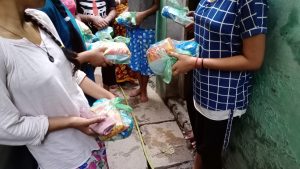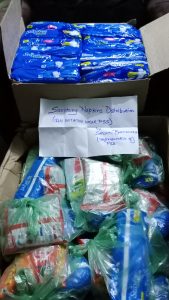SHARING IS CARING
By Srishti Bhattacharya, Trainee Social Worker, Department of Social Work, University of Delhi
In the era of the novel coronavirus, where underprivileged sections of the population including women and girls are facing hardships in maintaining a decent standard of life, even a small form of assistance can be fruitful in bringing smiles to their faces.
As a trainee social worker, I decided to assist the people of my hometown Varanasi by providing additional essential products which were usually ignored in food ration kits being distributed by most civil society organizations. These were items of personal hygiene for women. Therefore, I took up the cause of Women’s Menstrual Health and Hygiene. To progress this issue, I contacted the Ward Councillor of my area and shared my idea with him. He then contacted the Women’s Group of our Ward. This group is active in addressing the social issues related to women and girls, and providing assistance in the work of distributing kits to them. Having obtained their support, the Ward Councillor and I made a bulk purchase of the following products:
- Sanitary Napkins
- Packets of Biscuit
- Packets of Wafers
- Bottles of Juice
- Bottles of hand sanitizer
- Masks
All these items were included in the kit (We dispatched 250 kits in total). The distribution of these kits took place on 31st May 2020 and 2nd June 2020 in Ward Number 71 which was known as Bangali Tola. We reached 250 beneficiaries comprised of adolescent girls and women.
After the successful completion of the distribution of the kit, the local area Councillor assured me that from that time onwards, they will include sanitary napkins as one of the products that would be included with the food ration kit.
I experienced immense satisfaction after this distribution because of the smiles that I witnessed on the faces of the beneficiaries and when they themselves came and thanked me for distributing the sanitary napkins. This feeling was heightened when they told me that they were unable to ask for these, and because sanitary products are too costly for them to afford. Affordability and accessibility to these essential items for women and adolescent girls were contingent upon their being able to provide a meal twice a day. Assuring that they could feed their families took top priority in their daily plans.
I, as a trainee, realized the worth ‘sharing happiness’ with others in form of a relief kit which included sanitary products and which could assist women and adolescent girls in maintaining good health. This sharing becomes possible when extending humane support to fellow inhabitants of my society, especially when they continue to struggle to survive with dignity and be treated with respect. I also assured them that, “I am here for you in your time of need. Do not hesitate to approach me as we are fellow brothers and sisters belonging to one community called Humanity.”




